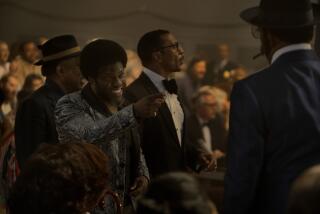The Opposing Corners in Today’s ‘Ali’ Matchup
The week before and after the release of “Ali,” I devoured every review and article I could get my hands on about the film and its making. The critics have generally given high marks to the film, and to Will Smith’s performance as Ali. Though Times film critic Kenneth Turan felt the film could have done much more to capture the inner essence of Ali, he still praised it as a decent, workmanlike effort.
I was delighted with the positive, even loving, spin the writers gave the film. I have been an unabashed fan of Muhammad Ali since he first burst on the sports scene four decades ago. I’ve seen all of his major fights and reveled in his victories. I cheered him the times I heard him speak, personally spoke with him on several occasions, and even helped sponsor and promote two of the talks he gave at the college I attended in the years that the sports establishment slammed the door shut on him.
When Ali refused the draft, embraced the Black Muslims, opposed the Vietnam War and refused Army induction, I applauded him for having the courage to stand up for his political and religious beliefs, to speak out for racial justice, and for his willingness to pay the steep price for doing so. This marked him as a true “People’s Champ.”
Armed with this lifelong admiration for Ali, and bolstered by the loud praise of the critics, I felt there was no way the film could miss. Unfortunately, it does, in three troubling ways.
The first miss is the plot. There is none. It rambles disjointedly from scene to scene, or maybe I should say vignette to vignette, with no central or defined focus. Many of the scenes--such as the opening one, with singer Sam Cooke crooning to a nightclub audience--have absolutely no relevance to the story line and seem to be tossed in as one of many fillers in the film. Some of the characters are only marginally identified, and this makes it difficult, if not impossible, to figure out their relationship or significance to Ali.
The second miss is in failing to take the audience into account. The majority of filmgoers are under age 35. Many weren’t born when Ali fought his titanic fights inside and outside the ring. What lessons about the struggle and sacrifice he made and the history that went into that struggle and sacrifice can they draw from a film that neglects to tell what drove Ali to prevail?
The worst miss is that the film fails to place Ali against the defining influence and monumental impact that the 1960s civil rights and black power movements had on young blacks (and non-blacks) of that era. These movements shaped Ali’s political and religious convictions. They explain why he was willing to risk his career and financial ruin to oppose the Vietnam War and the draft. The short shrift given these movements makes Ali seem little more than an impetuous, headstrong showboat who took controversial stands simply because he wanted to.
The two pivotal characters who defined the 1960s black movement fare poorly in the film. Martin Luther King Jr. is seen only fleetingly in a picture, shaking hands with Malcolm X. But how many filmgoers under, or for that matter over, age 30 would know that it’s King? Malcolm comes off as a bland, lurking presence with none of the passion and fire that made Malcolm, well, Malcolm.
The two men and the movements they represented profoundly influenced the young Ali. Not only is this missing, but one scene even stands historical truth about King on its head. Ali’s attorney is talking to him on a pay phone at the Lorraine Motel in Memphis the moment that King is shot. The conversation didn’t happen at that time and place, and even if it did, there is absolutely no hint that it was King who lay dying on the balcony of the motel.
Ali absorbed the hardest blows that ferocious opponents, a hostile government, a fickle public and a vengeful sports establishment could throw at him. He beat them all, and in the process showed that he really did have the stuff of greatness. The pity is that “Ali” doesn’t.
*
Earl Ofari Hutchinson is author of “The Disappearance of Black Leadership” and hosts a talk show on KPFK-FM (90.7), Tuesdays at 7 p.m. He can be reached at [email protected].
More to Read
Only good movies
Get the Indie Focus newsletter, Mark Olsen's weekly guide to the world of cinema.
You may occasionally receive promotional content from the Los Angeles Times.










